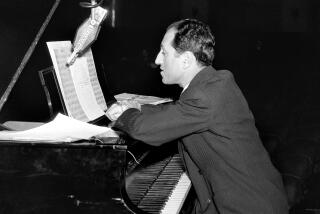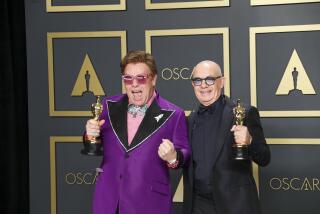It’s Very Clear--Our Gershwin Is Here to Stay
- Share via
The point beyond which talent can be called genius is harder to discern than the line on a blizzard-swept mountain where Nepal becomes China.
Was George Gershwin a musical genius, or a supremely talented composer who had aspirations to infuse “serious” music with jazz rhythms and a blues feeling?
It seems only a little less an accolade to call him supremely talented and put “genius” back in the vault for later consideration.
What is beyond dispute is that Gershwin took the American popular song to new levels of sophistication, surprise, rhythmical complexity and a lyrical freshness that ignored the banal chord structures and phrase lengths of Tin Pan Alley.
He replaced the tin with shinier and more precious metals, as can be heard in “ ‘S Wonderful,” the second of the two-part “Great Performances” tribute called “Celebrating Gershwin” and airing Friday night (Channel 24 at 8 and Channel 28 at 9:10 p.m., after a pledge break).
The tribute is in effect a four-hour variety show, inspired and hosted by conductor Michael Tilson Thomas, who was asked by the Gershwin family to oversee this 50th-anniversary commemoration of Gershwin’s death, at only 39, in 1937.
Earlier in the year television offered a Gershwin biography, and some of the brief film clips of the composer himself from the biography help, with others, to punctuate “Celebrating Gershwin.”
In this second half of an all-star concert, Gershwin is shown, and heard, ceremonially purchasing a concert ticket to mark the end of Pittsburgh’s Sunday blue laws. Here he is at poolside in Hollywood with Lillian Hellman, clowning with Jascha Heifetz, chatting (silently, alas) with brother Ira Gershwin, who died in 1983 and whose witty and unhackneyed lyrics ideally complemented George’s melodies.
Like any first-rate musical revue, “ ‘S Wonderful” is a wild mixture of talents and moods. Bob Dylan, of all unlikely entrants, sings “Soon” from “Strike Up the Band” and proves, I think, that Dylan writes better for Dylan’s harmonica and guitar than Gershwin did.
Mikhail Baryshnikov dances some new Dan Siretta choreography to four lyrical fragments, three of them lately discovered in the Gershwin archive and now performed publicly for the first time. It is charming rather than electrifying, its allegiance to Broadway more than to Covent Garden.
There are marvelously appropriate moments: a medley by Liza Minnelli and Michael Feinstein (who was Ira Gershwin’s secretary and has become a leading celebrant of the songs). They do the torchy “Who Cares” and “Liza” and she sings an exemplary “Embraceable You.”
Cynthia Haymon and Ruby Hinds sing another rescue from the archive, the eloquent “Lonely Boy,” written for but dropped from “Porgy and Bess” in favor of a reprise of “Summertime.” The performance is its world premiere.
The two hours build to a finale featuring Johnny Green at the piano, playing and conducting a medley of orchestrations he wrote for the Gershwin movies. (Green found all but one of the original orchestrations in his music library.)
The new generation of performers for the medley include Christopher Walken (“They Can’t Take That Away From Me”); Maureen McGovern (“They All Laughed”); Madeline Kahn and Larry Kert (“Let’s Call the Whole Thing Off”); Harold Nicholas (“Slap That Bass”); Rosemary Clooney handsomely describing “A Foggy Day,” and the dazzling soprano Erie Mills with Gregg Burge doing “Love Is Sweeping the Country.” It is a heart-grabber.
The large cast further embraces Chita Rivera, Tommy Tune, Drew Barrymore and Damon Evans (a moving performance of “Boat Dat’s Leavin’ Soon for New York” from “Porgy”) and Bobby Short, concluding the program with “Our Love Is Here to Stay.”
Host Thomas, now principal conductor of the London Symphony Orchestra, leads the LSO in Gershwin’s “Second Rhapsody” from 1932, which like “Concerto in F” seems to be seeking a third form somewhere between popular and classical music (labels that seem even less precise than usual in Gershwin’s case).
Arthur Whitelaw produced the programs and Humphrey Burton and Patricia Birch were the co-directors. The three, and Thomas, are credited with the conception.
It remains astonishing, as Michael Tilson Thomas says, how much Gershwin created in his 19 productive years, and how potent the songs remain.
More to Read
The biggest entertainment stories
Get our big stories about Hollywood, film, television, music, arts, culture and more right in your inbox as soon as they publish.
You may occasionally receive promotional content from the Los Angeles Times.










